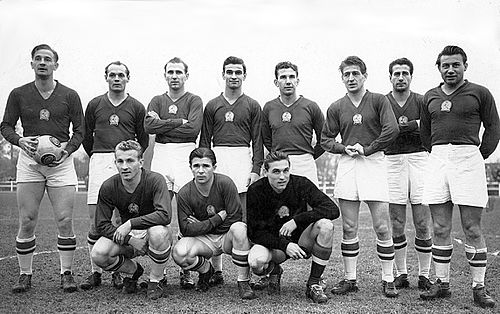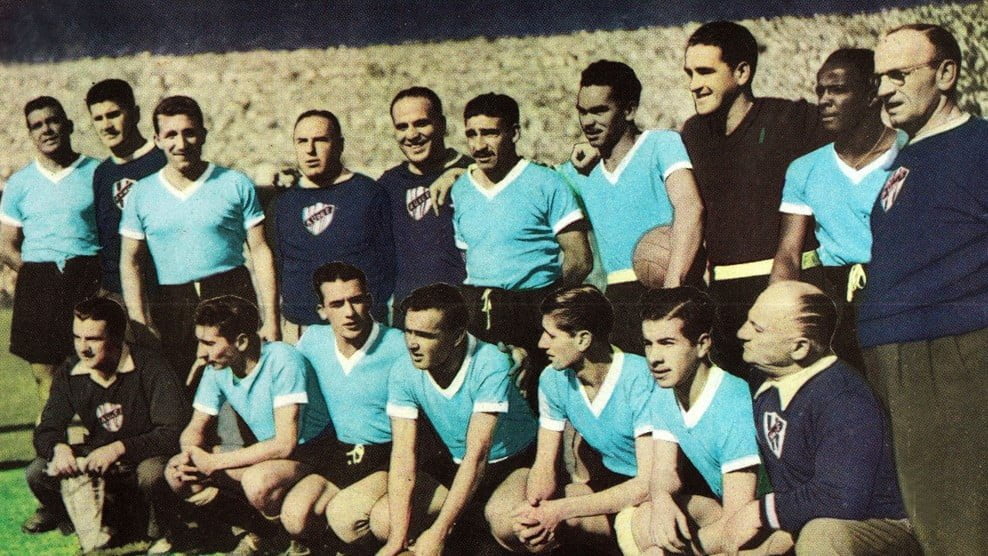The World Cup is unarguably the biggest and most prestigious competition in footballing history and winning the trophy ranks high on the wish-list of every world-class footballer.
Every four years since 1930 (apart from the years during World War 2), the best nations in the world gather to contest for the title of being the elite footballing team on the planet.
Given the difference in pedigree and quality of players available to different countries of the world, it stands to reason that some are more highly ranked than others and are usually more fancied to triumph in international tournaments.
While some favorites such as Spain in 2010 and Brazil in 1970 went on to achieve success in the World Cup, numerous others failed to step up to the plate.
Here, we shall be having a rundown of 10 countries who were overwhelming favorites heading into the World Cup but failed to step up to the plate.
Honorable mentions: England (2006), Brazil (1998)
#10 Argentina (2002)
Argentina comfortably topped the CONMEBOL Qualification series for the 2002 World Cup and they went into Korea/Japan as joint-favorites for the tournament alongside France.
Los Albiceleste had players like Ariel Ortega, Diego Simeone, Hernan Crespo, and Gabriel Batistuta in its ranks and despite being grouped in what was termed ‘the group of death’ alongside Sweden, England, and Nigeria, the South Americans were expected to prevail.
Things got off to a comfortable start for Argentina with a 1-0 victory over Nigeria in the opening game of Group F sending them to the top of the pile.
However, a 1-0 loss to England in their next fixture put them on the precipice and they needed a victory in their last game to progress, but they could only record a 1-1 stalemate.
Sweden and England progressed from the group, with five points apiece. Argentina could only muster four points and were thus eliminated, marking the first time since 1962 that they failed to make it to the next round of the World Cup.
#9 Italy (1990)
The Italian Serie A was by far the most dominant football league in Europe in the late 1980s and early 1990s, with AC Milan ruling the roost and ably supported by clubs like Juventus, Napoli, and Inter Milan.
In light of this, the Azzurri entered the 1990 World Cup on home soil as the clear favorites, with players like Roberto Baggio, Paolo Maldini, and Franco Baresi in the squad.
The Italians breezed through their group stage and made it to the semi-final as one of the few sides who played attacking football in what was an ultra-defensive tournament.
In the last four, they came up against a Diego Maradona led Argentina and the defending champions played the hosts at their own game, with coach Carlos Bilardo deploying ultra-defensive tactics to stifle the free-flowing Italians.
The game was decided by a penalty shootout, with Argentina triumphing after Roberto Donadoni and Aldo Serena had their spot-kicks saved by Sergio Goycochea. They had to settle for third place instead.
#8 Portugal (1966)
Portugal’s charge at their maiden appearance at the World Cup was led by Eusebio who was widely regarded as the best forward in the game at the time and the Benfica star was ably supported by some of his club teammates including Mario Coluna and Antonio Simoes.
Despite this being their debut tournament, Portugal was highly fancied due to the success of Benfica at club level and the Iberian nation comfortably topped their group – also containing Brazil – with three wins from three, before overcoming an initial 3-0 scare to defeat fellow newcomers North Korea 5-3 in the quarterfinal.
They ultimately fell to defeat in a 2-1 loss to England in the last four, finishing in third place instead, but Eusebio delivered on his pre-tournament hype by finishing as the competition’s top scorer with nine goals.
#7 Austria (1934)
The Austrian team of the 1930s is regarded to this day as one of the finest national teams in history and they affectionately earned the term ‘ wunderteam’. They were managed by the legendary Hugo Meisl who deployed a playing style based on the Scottish school of football which emphasized quick passing.
The side was led by the iconic forward Josef Bican and he had support from other world-beaters of the time like Matthias Sindelar, Anton Schall, Josef Smistik, and Walter Nausch.
Opponents were usually dispatched with relative ease and Austria were the overwhelming favorites to triumph in the second edition of the World Cup in 1934 staged in Italy.
However, they could only finish in fourth place after falling to Italy in the semifinal in a match that was characterized by poor weather conditions and a visibly biased referee favored the home side.
#6 Brazil (2014)
When Brazil were awarded the rights to the 2014 World Cup, there was widespread jubilation in the country, as many saw it as an opportunity to right the wrongs from 64 years earlier.
Football is more than just a game in Brazil and had achieved almost mythical status, but despite having triumphed in the World Cup on five occasions, the Samba Boys were yet to do it on home soil, with the previous opportunity ending in heartbreak.
The fact that they defeated Spain – who were the best team in the world at that time – to lift the 2013 Confederations Cup in front of their fans a year earlier only served to heighten expectations.
Neymar was widely regarded as the poster boy of football and was on the rise, the 2002 World Cup-winning coach Luis Felipe Scolari had returned to the helm and everything seemed set for a sixth world title.
It started well enough for the Selecao and they comfortably topped their group with maximum points, but a scare came in the round-of-16 when Chile took them to a penalty shootout.
Brazil ultimately triumphed and 250 million people heaved a sigh of relief. Fellow South Americans Colombia were dispatched 2-1 in the quarterfinal, but the victory came at a cost, as Neymar was ruled out of the tournament.
Without their talisman, the home side fell to an embarrassing 7-1 defeat to eventual champions Germany and just like that, the dream was over in the most shameful of fashions.
#5 France (2002)
France entered the 2002 World Cup as defending champions and were also European Champions, thus heavily fancied to become the first side since Brazil 50 years earlier to successfully defend their world title.
However, Les Bleus got off to the worst possible start, falling to a 1-0 defeat to debutant Senegal and that set the tone for their subsequent matches as they became the first defending champions to be eliminated from the group stage.
Despite having the services of the reigning World Player of the Year Zinedine Zidane and the Golden Boot winners in four of the top five leagues in Europe that season, France failed to score a single goal in the tournament and their disastrous performance led to the banishment of the former rule of automatic qualification to the World Cup for defending champions.
#4 Brazil (1982)
Brazil as a country have a history of producing teams with flair who entertain and play the game with attacking verve, but none of the Brazilian teams throughout history had as much flair and finesse as the squad fielded at the 1982 World Cup.
Led by the majestic Zico and ably supported by other world-beaters like Falcao, Socrates, and Eder, Brazil went to Spain as favorites and comfortably topped their group, picking up maximum points with three wins from three matches.
They were subsequently drawn with Italy and Argentina in a second group stage but got eliminated after losing 3-2 to Italy in what is one of the all-time classic matches in World Cup history.
#3 The Netherlands (1974)
The Hungarian national team of the 1950s is widely credited with introducing total football – a system whereby players are versed in playing different roles -, but the Dutch side of the 1970s helped propagate it to a wider audience.
Rinus Michels had applied the concept with Ajax at club level, guiding the Amsterdam outfit to three consecutive European Cup triumphs between 1971 and 1973 and he was brought in to help guide The Netherlands to victory at the 1974 World Cup in West Germany.
The legendary Johan Cruyff was at the height of his powers at this stage and was the reigning Ballon d’Or winner heading into the tournament.
Cruyff wowed audiences the world over with his performances alongside other stalwarts like Johan Neeskens and Piet Keizer, with their interchanging positional play and fluidity winning neutrals over to their side.
This tournament saw the introduction of the widely reenacted ‘Cruyff turn’ and The Netherlands blitzed their way to the final where they ultimately fell to 2-1 defeat to the hosts West Germany despite taking an early lead.
#2 Hungary (1954)

While current fans of the game cannot identify with Hungary as a major footballing force, very old followers of football would recall a time when the Eastern European nation were the dominant footballing nation in football.
In the early 1950s, the Hungarian national team was an unstoppable winning machine that consisted of the ‘holy trinity’ of Ferenc Puskas, Nándor Hidegkuti, and Sándor Kocsis and they won the Gold medal at the 1952 Olympic Games.
They embarked on an unbelievable run between 1950 and 1956 that saw them lose just one match from 50 games, with 42 fixtures ending in most very convincing victories.
That one loss came in the final of the 1954 World Cup where West Germany defied all odds to defeat the highly fancied Hungarian national team.
What made their victory more curious was that earlier in the group stage, the Germans had lost to Hungary by the embarrassing scoreline of 8-2.
To date, this Hungarian side is regarded as the best in the history of football and many believe they would have won a World Cup if the squad was not disbanded by the Hungarian revolution in 1956.
#1 Brazil (1950)
The Brazilian nation suffered national heartache when they fell to a 2-1 defeat to Uruguay in the deciding match.
Both sides had finished as winners of their respective groups and were subsequently drawn in another group of four to decide the eventual winner.
With Brazil having won the first two matches of the group, scoring 14 goals in the process, they entered the fixture with Uruguay on four points (two points were awarded for a win back then), while their opponents had three points (one win and one draw).
This meant that the hosts needed just a draw to win their first world title and they went some way to achieving their aim when Friaca put them ahead in the 47th minute, but a comeback victory for Uruguay was completed when Alcides Ghiggia scored in the 79th minute after an error by Brazilian goalkeeper Barbosa.
Given the attacking nature of Brazil and the fact that they had thumped Uruguay 5-1 a few months earlier, the Brazilian press and public were very confident of victory, with 22 Gold Medals already prematurely prepared for the Brazilian players, while the city of Rio de Janeiro had prepared celebratory carnivals.
The defeat stunned over 199,000 fans into silence at the Maracana and the defeat is referred to this day as the Maracanazo.
The one silver lining from this gloomy day in Brazilian football is that the despair led a 10-year-old Pele to promise his father that he would make up for the defeat and bring the World Cup home which he did eight years later.








